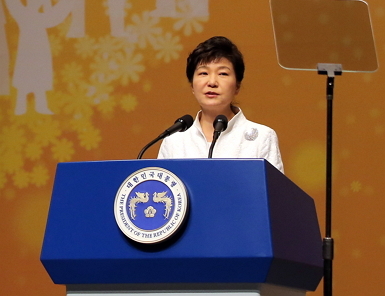President Park Geun-hye on Sunday urged Japan to face up to and sincerely atone for its brutalities during colonial rule as a first step to writing a “new history” with Korea for the next 50 years.
In her Independence Movement Day address, she called for the two Koreas to meet to discuss reunions of families displaced by the 1950-53 Korean War, while expanding cooperation in sports, culture, arts and humanitarian areas.
With the Korea-Japan relationship marking the 50th anniversary of its normalization, Park stressed a resolution of the issue of Japan’s sexual enslavement of Korean women during World War II, calling it a “historical task that must be tackled on the two countries’ journey to the future.”
“History is not to be selectively remembered at one’s convenience, and acknowledging history is the only path to progress,” the president said, citing Alexis Dudden, a historian at the University of Connecticut who recently led a group of 19 U.S. scholars to issue a statement in protest against Japan’s attempts to press a textbook publisher to alter descriptions regarding the sex slavery.
“As Germany and France have in the past managed to surmount conflict and enmity and jointly lead the establishment of a new Europe, I hope Japan will now accept the historical truth in a brave and honest manner and join hands with Korea to write a new history as partners for the 50 years ahead.”
Park’s remarks appear to be intended to ratchet up pressure on Japanese Prime Minister Shinzo Abe, whose populist credentials have triggered concerns he may stoke further tensions by displaying revisionist views, such as through an envisaged address at U.S. Congress or a statement marking the 70th anniversary of World War II later this year.
But her tone was somewhat softer compared with two previous speeches. Last year, she took a harder line in the wake of the premier’s visit to the controversial Yasukuni war shrine, saying that “a leader who cannot concede past wrongdoings will not be able to chart a new future.”
With their bilateral sex slavery talks remaining in a gridlock, fatigue is growing gradually in the government and academic circles in Washington, powered in part by Japan’s intensified lobbying, that Seoul’s lack of flexibility and practical diplomacy is complicating a crucial three-way security partnership including Tokyo in the face of rising North Korean threats, sources say.
At a seminar in Washington on Friday, Wendy Sherman, under secretary for political affairs at the U.S. Department of State, said that “disagreements” about history and territory issues between South Korea, Japan and China are “understandable, but it can also be frustrating.”
“Nationalist feelings can still be exploited, and it’s not hard for a political leader anywhere to earn cheap applause by vilifying a former enemy,” she said.
“But such provocations produce paralysis, not progress. To move ahead, we have to see beyond what was to envision what might be. And in thinking about the possibilities, we don’t have to look far for a cautionary tale of a country that has allowed itself to be trapped by its own history.”
A senior official at Seoul’s Foreign Ministry downplayed her assessment as nothing new, saying it will be an “overinterpretation” to conclude that it was to back Japan’s claims while taking a swipe at South Korea and China.
“In the overall context, her remarks were in line with the U.S.’ basic viewpoint that it serves U.S. interests that the three Northeast Asian countries cooperate closely to boost regional stability, peace and prosperity,” the official told reporters on customary condition of anonymity due to the sensitivity of the matter.
“She also clearly indicated that the countries should learn the lessons of the past, heal wounds of history and forge a future-oriented partnership.”
As to Pyongyang, Park apparently sought to convey relatively conciliatory messages and focus more on humanitarian and civilian exchanges than military issues.
This reflects South Korea’s pursuit to bring the communist regime to the negotiating table, now that it has set better cross-border ties and unification preparation as the centerpiece of Park’s third-year presidency.
“Our efforts to prepare for unification is ever aimed at isolating North Korea but to help lead it to come out as a responsible member of the international community and take the course of mutual prosperity and peace,” she said.
“North Korea should no longer turn away from inter-Korean dialogue.”
The family reunions remain a top priority given the rapid aging of the survivors, she said, reiterating calls for talks “as soon as possible” to arrange regular meetings and exchange of letters and the identification of the families.
To help restore the divided state’s national homogeneity, Park pledged to support various joint cultural and economic projects such as for historical study and a trans-peninsula railway.
“North Korea should forgo the illusion that nuclear weapons will provide protection, and come out and take the path to opening up and change that can improve the livelihoods of the people and earnestly guarantee peace and regime stability,” the president added.
Early this year, Seoul proposed inter-Korean meetings to discuss “all issues of mutual interest” including a possible lifting of bilateral sanctions and restart of lucrative tours to a mountain resort in the North. The North Korean leader also boosted hopes for a thaw by expressing, in his New Year address, his willingness for “highest-level” talks with the South.
Yet the mood quickly cooled as the sides failed to build on the momentum and instead continued spats such as over launches of anti-Pyongyang leaflets by civic groups here.
With South Korea and the U.S. scheduled for annual military drills until late April, tension on the peninsula will likely escalate as the Kim regime engages in a show of force in retaliation, firing short-range missiles, breaching the de-facto maritime border or staging other small-scale provocations, experts say.
By Shin Hyon-hee (
heeshin@heraldcorp.com)








